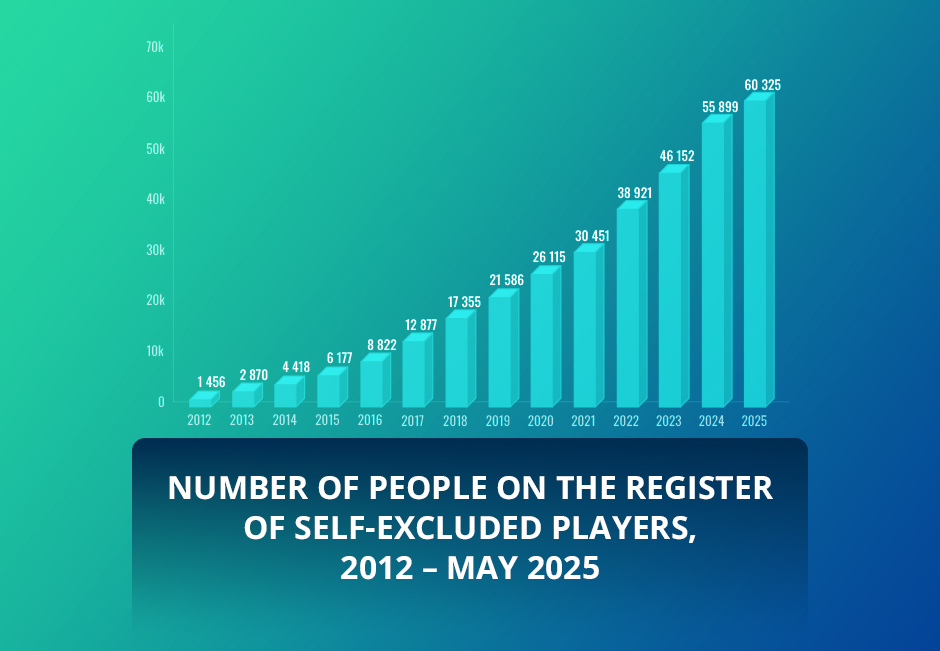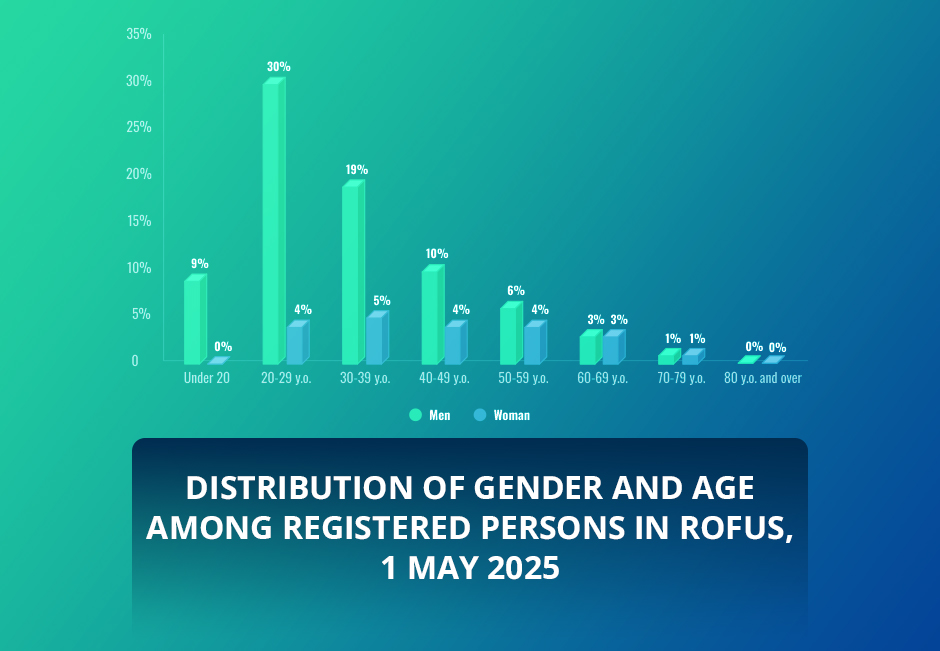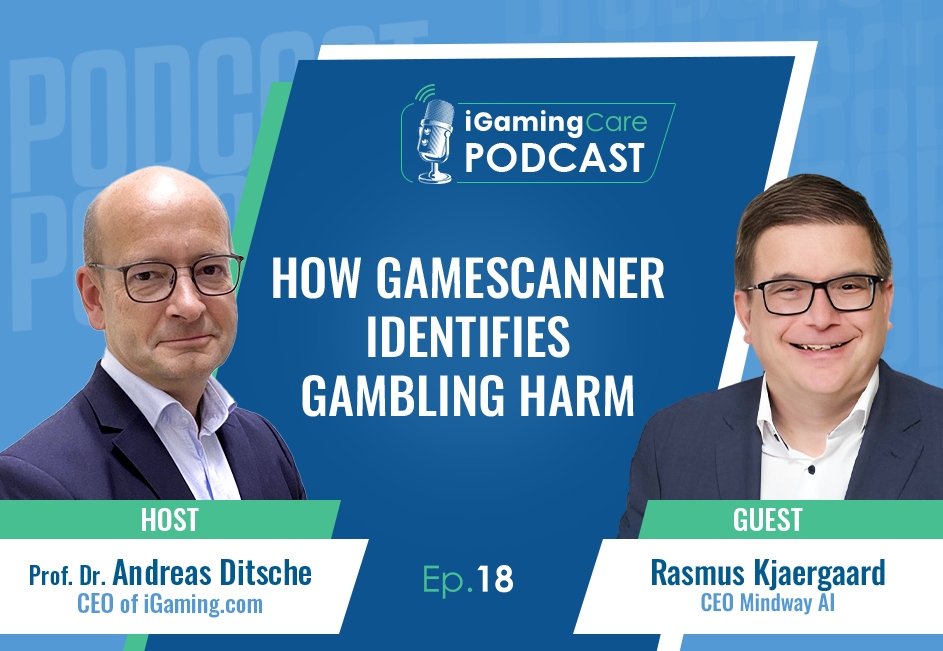
Denmark’s ROFUS Surpasses 60,000 Self-Exclusions

More than 60,000 Danes have voluntarily self-excluded from gambling, according to the Danish Gambling Authority (Spillemyndigheden).
On 1 May 2025, ROFUS (Register of Self-Excluded Players) registrations reached the key milestone. The latest figures reflect a 4,000% increase since the program’s launch in 2012.
But what is behind the rapid rise in self-exclusions?
The surge is due to increased awareness of ROFUS and a better understanding of the risks of gambling. Let’s explore the trend in more detail.
What Is ROFUS?
ROFUS is the national self-exclusion system in Denmark. It allows individuals to exclude themselves from gambling activities voluntarily. This includes licensed online platforms, land-based casinos, and retail betting shops.
The scheme is operated by the Danish Gambling Authority (Spillemyndigheden). It was created in 2012 to help curb gambling addiction. The system is designed to empower players to take control of their gambling habits.
Registering with ROFUS offers individuals a confidential and effective way to prevent gambling-related harm. The registry enables self-exclusion in under three minutes on any device.
Users can select from five exclusion options:
- 24-hour cooling-off period
- One-month break
- Three-month suspension
- Six-month pause
- Permanent ban
This flexibility addresses varying severity levels of gambling harm. It accommodates temporary financial or psychological crises. At the same time, it ensures that individuals with more serious, long-term issues have suitable options. Here is a breakdown of ROFUS self-exclusions by category:
| Type of registration | Percentage of registrants |
|---|---|
| 24 hours | 0% |
| 1 month | 7.5% |
| 3 months | 11.61% |
| 6 months | 16.6% |
| Permanent ban | 64.29% |
Of the 60,325 registered individuals on 1 May, 64.29% have chosen permanent self-exclusion, while 35.71% have opted for temporary restrictions.
Those choosing permanent exclusion cannot reverse their decision for at least one year. The clause creates a deliberate barrier against impulsive reactivation.
Drivers Behind the Surge in Self-Exclusions
The Danish Gambling Authority’s report shows that ROFUS has experienced exponential growth since its inception. It has surged from just 1,456 registrants in 2012 to 60,325 by May 2025.
The 41-fold increase is driven by greater awareness of problem gambling and targeted regulatory measures. The following graph shows the number of people registered on ROFUS each year:

In recent years, the Danish Gambling Authority has stepped up efforts to promote ROFUS. For example, a national TV campaign in September 2021 boosted public awareness of self-exclusion options to 45%.
Since January 2020, Danish law has required all licensed online operators and land-based casinos to include ROFUS in their marketing. Retail betting outlets were added to this requirement in October 2023.
Licensed operators must display ROFUS information during sign-up, deposits, and responsible gambling sections. Non-compliance triggers license reviews. These requirements have raised awareness of self-exclusion options among Danish gamblers.
“It is gratifying that those who need to exclude themselves from gambling are using ROFUS. This shows that awareness of the tool is growing and that it fulfils an important function in the effort against gambling addiction.”
Anders Dorph Director of the Danish Gambling Authority
Young Men Are Increasingly Self-Excluding from Gambling
The demographic data reveals significant gender and age imbalances among self-excluders. As of May 2025, 78% of all ROFUS registrants are men. This trend has remained consistent since the program’s launch.
Young men dominate recent enrollment spikes. 58% of male registrants are under 40, while the under-20 age group is 96% male. Here is a chart showing the distribution of gender and age among ROFUS registrants:

This trend could be linked to Spillemyndigheden’s 2025 campaign “Take it easy with ROFUS”. It targets young men through social media and gaming platforms to destigmatize self-exclusion.
The campaign reframes self-exclusion as a socially responsible choice rather than a failure. It features relatable scenarios like peer pressure during sports events and late-night gaming sessions.
The Danish Gambling Authority also frequently conducts presentations with youth education programs. These efforts are likely contributing factors to the rising awareness of gambling-related issues within the younger age group.
“The figures confirm a trend we have seen for several years – namely that young men are particularly at risk of problematic gambling behavior. Therefore, we work purposefully with information in this particular group, including through presentations at youth educations.”
Anders Dorph Director of the Danish Gambling Authority
Comparative Self-Exclusion Models
Denmark’s ROFUS system mirrors several other self-exclusion programs across Europe. Examples include the UK’s GAMSTOP and Spain’s Registro de Autoprohibidos. These allow individuals to block themselves from online and land-based gambling activities voluntarily.
Like Denmark, countries including Sweden, Italy, and the UK have seen rising self-exclusion numbers. In the UK, for instance, GAMSTOP reported record registrations in January 2025.
These trends suggest a broader shift in public attitude toward responsible gambling. They also underpin the importance of regulatory changes and targeted educational campaigns relating to safer gambling tools.
Implications for Global Responsible Gambling
ROFUS’ success highlights the effectiveness of combining user-friendly design with demographic targeting and regulatory action. This approach has helped normalize self-exclusion.
The program’s growth, from around 1,500 to 60,000 registrants in 13 years, offers valuable lessons for other countries. Key elements include:
- Frictionless access: Players can complete registration in under three minutes.
- Tiered exclusion: Supports both crisis intervention and long-term recovery.
- Operator mandates: Legally enforced promotion of self-exclusion to raise awareness among players.
- Demographic precision: Media campaigns and education tailored to the highest-risk groups.
Gambling authorities in Germany, Portugal, and the Netherlands are developing next-generation self-exclusion systems. ROFUS provides a great example of effectively balancing player protection with ease of use for players and operators.
The 60,000 milestone marks a significant shift. Self-exclusion is moving from a last resort to a mainstream responsible gambling tool. Younger age groups view voluntary exclusion as a sign of empowerment rather than defeat.

